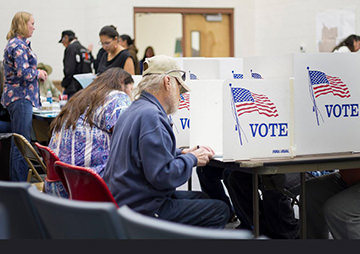Was Your Vote Counted?
Voter-suppression tactics targeted communities of color and may have led to inaccurate voting results in the 2016 election. Greg Palast, along with other voting-suppression experts, goes to Washington, D.C., to discuss the new "Jim Crow" elections.
Voters at a polling station. (Flickr / Lindsay D’Addato)
WASHINGTON, D.C.—”This is a Jim Crow election,” said Greg Palast, describing this year’s vote. The investigative reporter was in Washington, D.C., this week to petition the Department of Justice to release 7.2 million “interstate crosscheck” names suspected of voter fraud.
After years of investigating voter suppression that targeted communities of color, Palast acquired a portion of the crosscheck list this year and noticed the bias. The list wrongly accused United States citizens of voting in two states if they shared a first and last name with another voter. As Palast explained, “Maria Isabel Hernandez of Virginia is supposedly the same voter as Maria Christina Hernandez of Louisiana.”
WATCH: Greg Palast: ‘We Need to Protect the Remnants of the Voting Rights Act’
On Monday, Palast, along with the Asian-American online advocacy group 18 Million Rising, delivered 50,000 petitions that demanded to know all the names on the crosscheck list. The votes of the people on the list were voided, or “spoiled,” unless those voters returned a government form confirming their legitimacy.
Palast’s findings revealed how the interstate crosscheck list targeted African-Americans, Asian-Americans and Latinos. One in seven voters of color was placed on the list.
“The civil rights commission found out if your vote spoils—that’s what they call it when your vote just doesn’t get counted—the chance your vote will spoil is 900 percent higher if you are black than if you are white,” Palast said.
On the day following Palast’s petition delivery, he shared his findings along with other voter-suppression experts on a “Voting Rights Alliance” panel in Washington, D.C. The panel explained how the Republican Party used voter-suppression tactics to its advantage in battleground states.
During the runup to the election, North Carolina struggled with issues such as vote flipping—in which a voter touches the name of one candidate on a screen, but another candidate’s name lights up—and removal of names from voting rolls.
The Rev. Rodney Sadler of the North Carolina NAACP discussed some voter-suppression tactics targeted at people of color.
“A bill—North Carolina House Bill 589—actually went to surgical precision to disadvantage African-American people,” Sadler said. “Ending same-day registration, requiring at least 25 days prior to the election for people to be registered, reducing the number of days for early voting from 17 to 10, ending preregistration of 16 and 17 [year old] high school students, ending out-of-precinct voting and adding the voter ID requirement with 25 percent of African-Americans and 20 percent of all 18 to 29 year olds who did not possess this form of ID. Even before the election cycle began, we knew there would be trouble.”
The Rev. David Alexander Bullock of the Highland Park (Mich.) NAACP spoke about broken voting machines in Detroit—plus the need to revise recount laws.
“When counters got to Detroit and tried to recount votes, 60 percent of the precincts in the city of Detroit were not recountable—396 precincts out of 662 were not recountable. Why weren’t they recountable? Well, because there is a horrible law in Michigan that if there is a broken seal or ballot box, then the precinct counts are invalid. … The recount laws need to be revised because it provides cover for election engineering.”
In face of the interstate crosscheck lists, harsher voting regulations and broken ballot-counting systems, Palast is looking toward reform rather than recounts.
“The whole point of the recount is not really the recount, but to look at those ballots that were never counted in the first place,” he said.
Independent journalism is under threat and overshadowed by heavily funded mainstream media.
You can help level the playing field. Become a member.
Your tax-deductible contribution keeps us digging beneath the headlines to give you thought-provoking, investigative reporting and analysis that unearths what's really happening- without compromise.
Give today to support our courageous, independent journalists.






You need to be a supporter to comment.
There are currently no responses to this article.
Be the first to respond.